Operatoonity.com review: Don Carlo presented by Opera Philadelphia
Composer: Giuseppi Verdi; text by Joseph Méry and Camille du Locle
Live performance: Sunday, April 26, 2015
The Academy of Music, Philadelphia

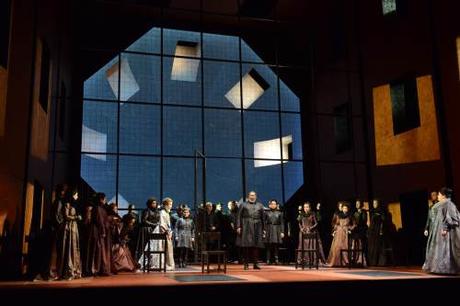
Opera Philadelphia’s Don Carlo |photos courtesy of Opera Philadelphia
The afternoon’s performance began with an announcement that role of Princess Eboli would be sung by mezzo-soprano Ekaterina Gubenova, who would warble from the wings while Michele DeYoung who suffered from bronchitis would act out the role only, lipsyncing throughout. One had to divide one’s attention three ways whenever Princess Eboli appeared–between the raked stage, the wings, and the supertitles.
The unveiling of an incomprehensible design concept followed–an octagonal backdrop that left me scratching my head because I didn’t understand how it related to story of the King of Spain marrying his son’s fiancée, a French princess, to end the war between France and Spain. The idea that one of the most powerful leaders of the Western world pined that the woman he stole from his son didn’t really love him may be a commonly romanticized Verdi sensibility but seemed ludicrous based on the actions of world leaders today.
Finally, at the beginning of the second half, an announcement was made that bass baritone Eric Owens, the show’s most luminous performer, was not feeling well and asked for the audience’s forbearance in the event his powerhouse aria wasn’t at its best.
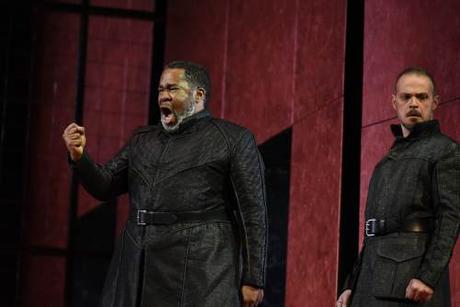
Bass-baritone Eric Owens as King Philip II | courtesy of Opera Philadelphia
While none of those items individually are deal breakers, they did lend themselves to an unusual experience collectively. The human voice may be the frailest of instruments–we all know that. Nonetheless, the audience is disappointed when it fails the performers in the show they are so expectant to see.
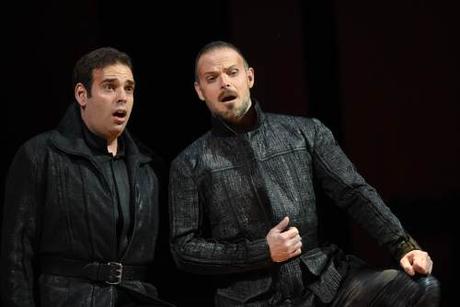
(L-r) Dimitri Pittas as Don Carlo and Troy Cook as Rodrigo.
As the lovelorn Don Carlo, New York tenor Dimitri Pittas was simply a dream. He looked the role and sung with unrelenting power and fluid grace. Singing the role of his former fiancée Elisabeth was soprano Leah Crocetto, who sang sweetly and precisely but was not ideally suited for the role physically as Don Carlo’s lover, coveted by men.
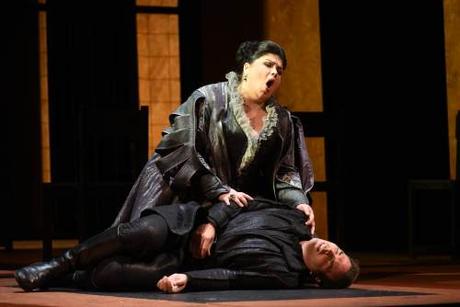
Leah Crocetto as Elisabeth De Valois
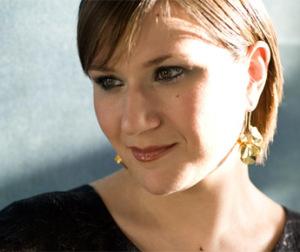
Ekaterina Gubanova
While no one would wish bronchitis on any performer, DeYoung’s illness did offer a first-time opportunitiy to hear Gubanova sing Princess Eboli. She recently performed the role at the Metropolitan Opera and was in top voice. She sings with temerity and a sultry black swan quality. I will certainly be looking for opportunities to see her perform in the near future. She was mesmerizing–merely singing opera in concert.
Baritone Troy Cook from Quakertown, Pennsylvania was ideally cast as the passionate Rodrigo who convinces Carlo to ask his father for governorship of Flanders, becomes King Philip’s pawn, and loses his life. He has a compelling presence on stage with a lyric baritone that is beautiful and powerful.
The biggest name on the bill was Metropolitan Opera star Eric Owens as King Philip. Despite the disclaimer that he wasn’t feeling well, his second-half aria where he laments that fact that Elisabeth never loved him was a showstopper. I have seen Owens perform several times, and if he could have sung that aria better than he did that afternoon, it would have been an operatic miracle. That being said, it does detract from one’s willing suspension of disbelief to be notified that he was ill. I was half expecting him to collapse on stage throughout because the aria is so physically and emotionally taxing.
As evil and selfish as he is, somehow King Philip doesn’t emerge from this story as the Numero Uno Baddie. That would be the The Grand Inquisitor sung with chilling menace by bass Morris Robinson.
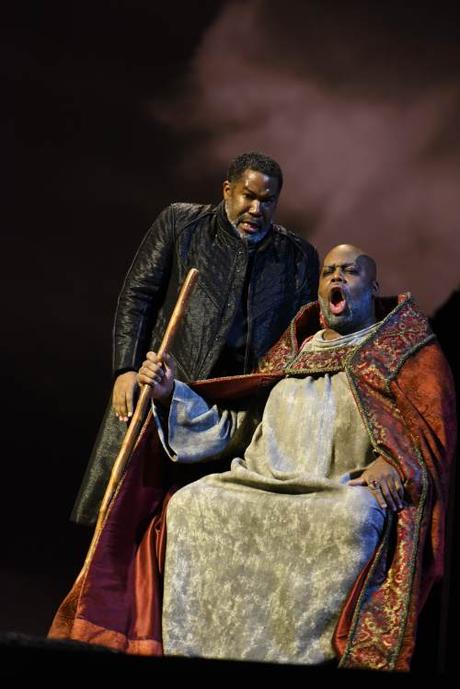
(L-r) Eric Owens as King Philip II and Morris Robinson as the Grand Inquistor
Yes, this opera does remind the audience that the reign of the Spanish Inquisition was one of the darkest periods in Western history. Not an easy feat. Consider all the other major contenders. However, did the production have to look so dark? The costumes varied from black to jet black, the set was dark and enigmatic throughout with dark atmospheric lighting, the storyline is relentlessly dark, and the overall effect was, well, oppressive. Sometimes dark becomes darker with the occasional infusion of light and lightness.
One such reprieve very early on was the Women’s Chorus singing as Elisabeth’s attendants. They were lovely to hear and see. Remarkable that the most oppressed sound and look light and airy in this opera and the oppressors dark and heavy.
Many elements made the show oddly satisfying, the Opera Philadelphia Orchestra notwithstanding. Conducted by Corrado Rovaris, the orchestra delivered one of the most consistently striking and admirable performances of the show.

